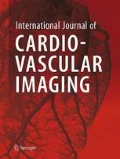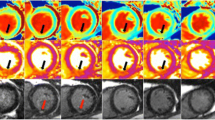Abstract
Myocardial salvage assessed by cardiac magnetic resonance imaging (CMRI) holds promise as a surrogate endpoint in studies comparing different treatment strategies for ST-elevation myocardial infarction (STEMI). The aim of this study was to evaluate the reliability of salvaged myocardium measurements by CMRI. Twenty patients underwent CMRI on 2 consecutive days early after reperfused STEMI to assess the area at risk (AAR) on T2-weighted and final infarct size (IS) on delayed enhancement images. Myocardial salvage index (MSI) was calculated (AAR minus IS). Agreement between scans 1 and 2 for the AAR, IS and MSI were analyzed using Bland–Altman analyses. Inter- and intraobserver reliability were assessed. Paired t testing revealed a trend for a significant difference for MSI between scans 1 and 2 (scan 1: 43.8 ± 22.5; scan 2: 45.5 ± 22.0; P = 0.052). The average difference for AAR and IS between scan 1 and scan 2 was −0.5 (upper limit of agreement 5.4% of left ventricular [LV] volume; lower limit of agreement −6.4%LV) and 0.1%LV (upper limit of agreement 2.3%LV; lower limit of agreement −2.1%LV). The corresponding calculated MSI measurements showed a mean bias of −1.7 (upper limit of agreement 5.5; lower limit of agreement −8.9). Coefficients of repeatability for interobserver variability were 3.6%LV for AAR, 2.4%LV for IS and 5.4 for MSI. Likewise, for intraobserver variability, coefficients of repeatability were 5.0%LV (AAR), 2.4%LV (IS) and 4.8 (MSI). Assessment of myocardial salvage by CMRI shows acceptable reliability. Further validation studies and trials showing the prognostic value of myocardial salvage by CMRI are needed before routine implementation as a surrogate endpoint in STEMI trials.


Similar content being viewed by others
References
Eitel I, Desch S, Fuernau G, Hildebrand L, Gutberlet M, Schuler G, Thiele H (2010) Prognostic significance and determinants of myocardial salvage assessed by cardiovascular magnetic resonance in acute reperfused myocardial infarction. J Am Coll Cardiol 55(22):2470–2479. doi:10.1016/j.jacc.2010.01.049
Ndrepepa G, Mehilli J, Schwaiger M, Schuhlen H, Nekolla S, Martinoff S, Schmitt C, Dirschinger J, Schomig A, Kastrati A (2004) Prognostic value of myocardial salvage achieved by reperfusion therapy in patients with acute myocardial infarction. J Nucl Med 45(5):725–729
Kastrati A, Mehilli J, Dirschinger J, Schricke U, Neverve J, Pache J, Martinoff S, Neumann FJ, Nekolla S, Blasini R, Seyfarth M, Schwaiger M, Schomig A (2002) Myocardial salvage after coronary stenting plus abciximab versus fibrinolysis plus abciximab in patients with acute myocardial infarction: a randomised trial. Lancet 359:920–925
Schomig A, Kastrati A, Dirschinger J, Mehilli J, Schricke U, Pache J, Martinoff S, Neumann FJ, Schwaiger M (2000) Coronary stenting plus platelet glycoprotein IIb/IIIa blockade compared with tissue plasminogen activator in acute myocardial infarction. Stent versus Thrombolysis for Occluded Coronary Arteries in Patients with Acute Myocardial Infarction Study Investigators. N Engl J Med 343(6):385–391
Wagner A, Mahrholdt H, Holly TA, Elliott MD, Regenfus M, Parker M, Klocke FJ, Bonow RO, Kim RJ, Judd RM (2003) Contrast-enhanced MRI and routine single photon emission computed tomography (SPECT) perfusion imaging for detection of subendocardial myocardial infarcts: an imaging study. Lancet 361:374–379
Aletras AH, Tilak GS, Natanzon A, Hsu L-Y, Gonzalez FM, Hoyt RF Jr, Arai AE (2006) Retrospective determination of the area at risk for reperfused acute myocardial infarction with T2-weighted cardiac magnetic resonance imaging: Histopathological and displacement encoding with stimulated echoes (DENSE) functional validations. Circulation 113(15):1865–1870
Friedrich MG, Abdel-Aty H, Taylor A, Schulz-Menger J, Messroghli D, Dietz R (2008) The salvaged area at risk in reperfused acute myocardial infarction as visualized by cardiovascular magnetic resonance. J Am Coll Cardiol 51(16):1581–1587
Ganame J, Messalli G, Dymarkowski S, Rademakers FE, Desmet W, Van de Werf F, Bogaert J (2009) Impact of myocardial haemorrhage on left ventricular function and remodelling in patients with reperfused acute myocardial infarction. Eur Heart J 30(12):1440–1449. doi:10.1093/eurheartj/ehp093
Bland JM, Altman DG (1986) Statistical methods for assessing agreement between two methods of clinical measurement. Lancet 1:307–310
Bland JM, Altman DG (1999) Measuring agreement in method comparison studies. Stat Methods Med Res 8(2):135–160
Tilak GS, Hsu LY, Hoyt RF Jr, Arai AE, Aletras AH (2008) In vivo T2-weighted magnetic resonance imaging can accurately determine the ischemic area at risk for 2-day-old nonreperfused myocardial infarction. Invest Radiol 43(1):7–15. doi:10.1097/RLI.0b013e3181558822
Carlsson M, Ubachs JF, Hedstrom E, Heiberg E, Jovinge S, Arheden H (2009) Myocardium at risk after acute infarction in humans on cardiac magnetic resonance: quantitative assessment during follow-up and validation with single-photon emission computed tomography. JACC Cardiovasc Imaging 2(5):569–576. doi:10.1016/j.jcmg.2008.11.018
Wright J, Adriaenssens T, Dymarkowski S, Desmet W, Bogaert J (2009) Quantification of myocardial area at risk with T2-weighted CMR: comparison with contrast-enhanced CMR and coronary angiography. JACC Cardiovasc Imaging 2(7):825–831. doi:10.1016/j.jcmg.2009.02.011
Mahrholdt H, Wagner A, Holly TA, Elliott MD, Bonow RO, Kim RJ, Judd RM (2002) Reproducibility of chronic infarct size measurement by contrast-enhanced magnetic resonance imaging. Circulation 106:2322–2327
Thiele H, Kappl MJ, Conradi S, Niebauer J, Hambrecht R, Schuler G (2006) Reproducibility of chronic and acute infarct size measurement by delayed enhancement magnetic resonance imaging. J Am Coll Cardiol 47(8):1641–1645
Abdel-Aty H, Simonetti O, Friedrich MG (2007) T2-weighted cardiovascular magnetic resonance imaging. J Magn Reson Imaging 26:452–459
Kellman P, Aletras AH, Mancini C, McVeigh ER, Arai AE (2007) T2-prepared SSFP improves diagnostic confidence in edema imaging in acute myocardial infarction compared to turbo spin echo. Magn Reson Med 57(5):891–897. doi:10.1002/mrm.21215
Aletras AH, Kellman P, Derbyshire JA, Arai AE (2008) ACUT2E TSE-SSFP: a hybrid method for T2-weighted imaging of edema in the heart. Magn Reson Med 59(2):229–235. doi:10.1002/mrm.21490
Giri S, Chung YC, Merchant A, Mihai G, Rajagopalan S, Raman SV, Simonetti OP (2009) T2 quantification for improved detection of myocardial edema. J Cardiovasc Magn Reson 11:56. doi:10.1186/1532-429X-11-56
Ibrahim T, Hackl T, Nekolla SG, Breuer M, Feldmair M, Schomig A, Schwaiger M (2010) Acute myocardial infarction: serial cardiac MR imaging shows a decrease in delayed enhancement of the myocardium during the 1st week after reperfusion. Radiology 254(1):88–97. doi:10.1148/radiol.09090660
Milavetz JJ, Giebel DW, Christian TF, Schwartz RS, Holmes DR Jr, Gibbons RJ (1998) Time to therapy and salvage in myocardial infarction. J Am Coll Cardiol 31(6):1246–1251. doi:S0735109798000886
Kwon DH, Halley CM, Carrigan TP, Zysek V, Popovic ZB, Setser R, Schoenhagen P, Starling RC, Flamm SD, Desai MY (2009) Extent of left ventricular scar predicts outcomes in ischemic cardiomyopathy patients with significantly reduced systolic function: a delayed hyperenhancement cardiac magnetic resonance study. JACC Cardiovasc Imaging 2(1):34–44. doi:10.1016/j.jcmg.2008.09.010
Roes SD, Kelle S, Kaandorp TA, Kokocinski T, Poldermans D, Lamb HJ, Boersma E, van der Wall EE, Fleck E, de Roos A, Nagel E, Bax JJ (2007) Comparison of myocardial infarct size assessed with contrast-enhanced magnetic resonance imaging and left ventricular function and volumes to predict mortality in patients with healed myocardial infarction. Am J Cardiol 100(6):930–936. doi:10.1016/j.amjcard.2007.04.029
Wu E, Ortiz JT, Tejedor P, Lee DC, Bucciarelli-Ducci C, Kansal P, Carr JC, Holly TA, Lloyd-Jones D, Klocke FJ, Bonow RO (2008) Infarct size by contrast enhanced cardiac magnetic resonance is a stronger predictor of outcomes than left ventricular ejection fraction or end-systolic volume index: prospective cohort study. Heart 94(6):730–736. doi:10.1136/hrt.2007.122622
Reimer KA, Jennings RB, Cobb FR, Murdock RH, Greenfield JCJ, Becker LC, Bulkley BH, Hutchins GM, Schwartz RPJ, Bailey KR (1985) Animal models for protecting ischemic myocardium: results of the NHLBI Cooperative Study: comparison of unconscious and conscious dog models. Circ Res 56:651–665
Thiele H, Engelmann L, Elsner K, Kappl MJ, Storch WH, Rahimi K, Hartmann A, Pfeiffer D, Kneissl GD, Schneider D, Möller T, Heberling HJ, Weise I, Schuler G (2005) Comparison of prehospital combination-fibrinolysis plus conventional care with prehospital combination-fibrinolysis plus facilitated percutaneous coronary intervention in acute myocardial infarction. Eur Heart J 26:1956–1963
Thiele H, Schindler K, Friedenberger J, Eitel I, Fürnau G, Grebe E, Erbs S, Linke A, Möbius-Winkler S, Kivelitz D, Schuler G (2008) Intracoronary compared with intravenous bolus abciximab application in patients with ST-elevation myocardial infarction undergoing primary percutaneous coronary intervention. Circulation 118:49–57
Lonborg J, Kelbaek H, Vejlstrup N, Jorgensen E, Helqvist S, Saunamaki K, Clemmensen P, Holmvang L, Treiman M, Jensen JS, Engstrom T (2010) Cardioprotective effects of ischemic postconditioning in patients treated with primary percutaneous coronary intervention, evaluated by magnetic resonance. Circ Cardiovasc Interv 3(1):34–41. doi:10.1161/CIRCINTERVENTIONS.109.905521
Thiele H, Hildebrand L, Schirdewahn C, Eitel I, Adams V, Fuernau G, Erbs S, Linke A, Diederich KW, Nowak M, Desch S, Gutberlet M, Schuler G (2010) Impact of high-dose N-acetylcysteine versus placebo on contrast-induced nephropathy and myocardial reperfusion injury in unselected patients with ST-segment elevation myocardial infarction undergoing primary percutaneous coronary intervention. The LIPSIA-N-ACC (Prospective, Single-Blind, Placebo-Controlled, Randomized Leipzig Immediate PercutaneouS Coronary Intervention Acute Myocardial Infarction N-ACC) Trial. J Am Coll Cardiol 55(20):2201–2209. doi:10.1016/j.jacc.2009.08.091
Kim HW, Farzaneh-Far A, Kim RJ (2009) Cardiovascular magnetic resonance in patients with myocardial infarction: current and emerging applications. J Am Coll Cardiol 55(1):1–16. doi:10.1016/j.jacc.2009.06.059
Fieno DS, Kim RJ, Chen EL, Lomasney JW, Klocke FJ, Judd RM (2000) Contrast-enhanced magnetic resonance imaging of myocardium at risk: distinction between reversible and irreversible injury throughout infarct healing. J Am Coll Cardiol 36(6):1985–1991. doi:S0735-1097(00)00958-X
Kim RJ, Fieno DS, Parrish TB, Harris K, Chen EL, Simonetti O, Bundy J, Finn JP, Klocke FJ, Judd RM (1999) Relationship of MRI delayed contrast enhancement to irreversible injury, infarct age, and contractile function. Circulation 100(19):1992–2002
Bondarenko O, Beek AM, Hofman MB, Kühl HP, Twisk JW, van Dockum WG, Visser CA, van Rossum AC (2005) Standardizing the definition of hyperenhancement in the quantitative assessment of infarct size and myocardial viability using delayed contrast-enhanced CMR. J Cardiovasc Magn Reson 7:481–485
Heiberg E, Ugander M, Engblom H, Gotberg M, Olivecrona GK, Erlinge D, Arheden H (2008) Automated quantification of myocardial infarction from MR images by accounting for partial volume effects: animal, phantom, and human study. Radiology 246(2):581–588. doi:10.1148/radiol.2461062164
Hsu LY, Ingkanisorn WP, Kellman P, Aletras AH, Arai AE (2006) Quantitative myocardial infarction on delayed enhancement MRI. Part II: Clinical application of an automated feature analysis and combined thresholding infarct sizing algorithm. J Magn Reson Imaging 23(3):309–314. doi:10.1002/jmri.20495
Hsu LY, Natanzon A, Kellman P, Hirsch GA, Aletras AH, Arai AE (2006) Quantitative myocardial infarction on delayed enhancement MRI. Part I: Animal validation of an automated feature analysis and combined thresholding infarct sizing algorithm. J Magn Reson Imaging 23(3):298–308. doi:10.1002/jmri.20496
Author information
Authors and Affiliations
Corresponding author
Rights and permissions
About this article
Cite this article
Desch, S., Engelhardt, H., Meissner, J. et al. Reliability of myocardial salvage assessment by cardiac magnetic resonance imaging in acute reperfused myocardial infarction. Int J Cardiovasc Imaging 28, 263–272 (2012). https://doi.org/10.1007/s10554-011-9802-9
Received:
Accepted:
Published:
Issue Date:
DOI: https://doi.org/10.1007/s10554-011-9802-9




